Due to Phil's travel schedule the Chronicle is released a day early this week...
The "coca, si; cocaine, no" policy of Bolivian President Evo Morales has brought peace to a region long riven by conflict and repression. But while coca farmers need no longer worry about violent conflict with the state, they are still having a hard time making enough money to survive. Plans are underway to do something about that.
With the release of its annual report this week, the International Narcotics Control Board has set its sights on Bolivia and that country's pro-coca policies. The US is also preparing to make a decision on whether to decertify Bolivia as not cooperating in American drug war goals. The Bolivians don't seem to care.
The court that not so long ago heard a case brought by Anna Nicole Smith will soon rule on whether students using the phrase "Bong Hits 4 Jesus" are entitled to 1st Amendment protection. The stakes are a lot more serious than the bizarre title may suggest.
In a Tuesday election, voters in Flint, Michigan, approved the medical use of marijuana by a very comfortable margin.
Three Salvadoran politicians were brutally murdered by Guatemalan anti-drug police outside Guatemala City 10 days ago. Now, the police killers have themselves been killed in a brazen assassination while being held inside a nasty Guatemalan prison. Many questions are being raised, but dead men tell no tales.
Long-time Irish talk show Gay Byrne is famous for tackling taboo subjects in Ireland. Now he's retired, but that hasn't stopped him from speaking out in favor of one of the remaining taboo subjects: drug legalization.
The mayor of Barre, Vermont, is fed up with drugs and drug policy, and his frustration is showing as he calls for both the legalization of marijuana and the death penalty for heroin and crack cocaine dealers.
A hush-hush Home Office briefing paper says Britain should begin prescribing heroin to hard-core users, a major London newspaper reports. It could happen as soon as next fall.
Ken Gorman, Amnesty and Mark Fiore on Colombia paramilitaries, cops against the drug war, California prison cigarette black market, Tony Papa art opening, Transform on James Bond and legalization, reports from JPI and Canadian HIV/AIDS Legal Network/OSI/IHRD
Support the cause by featuring automatically-updating Drug War Chronicle and other DRCNet content links on your web site!
A new way for you to receive DRCNet articles -- Drug War Chronicle and more -- is now available.
Visit our new web site each day to see a running countdown to the events coming up the soonest, and more.
For more than two decades beginning in the early 1980s, various Bolivian governments working at the behest of the United States government embarked on a policy of forced eradication of coca crops in Bolivia's Chapare, a lowland region in the state of Cochabamba. It was a time of strife and conflict, human rights violations and peasant mobilizations as tens of thousands of families dependent on the coca crop fought with police and soldiers, blocked highways, and, eventually, coalesced into a powerful political force that helped topple governments. Now, with a Chapare coca growers' union leader, Evo Morales, sitting in the presidential residence in La Paz, times have changed and the days of a US-imposed "zero coca" policy are history.
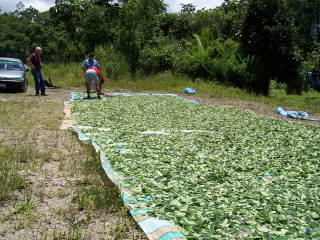
coca leaves drying by side of highway
Under US-imposed legislation adopted in 1988, Law 1008, only peasants in the traditional coca growing region of the Yungas were allowed to grow coca, and total coca production was limited to 30,000 acres. But that did not stop peasants from growing coca in the Chapare, where, in the early 1980s, production had boomed during the "cocaine coup" years of Gen. Luis Garcia Mesa. The development of coca production in this non-traditional, non-allowed area was the most significant target of US-backed forced eradication efforts throughout the 1990s and the beginning of this decade.
As a result, human rights violations by US-trained and -financed anti-drug forces were rampant. "During this period, I would receive an average of 10 complaints a day from coca growers," said former Chapare human rights ombudsman ("defensor del pueblo") Godofredo Reinecke. "Murders, rapes, robberies, assaults, all of that, committed by soldiers and police against the growers," he told Drug War Chronicle this week.
Now, things are different. While soldiers remain in the area, a special police force assigned to the area to prevent road blockades and other upheaval has been removed at the behest of the US -- because there was nothing for it to do. The peasant uprisings have ended, the blocking of highways is history, and human rights violations by the security forces have dropped precipitously. There is peace in the Chapare, and that is because of the abandonment of the "zero coca" policy.
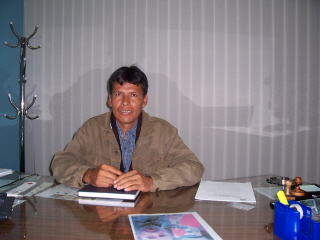
Bolivian congressman Asterio Romero spoke with Drug War Chronicle this week.
The change actually began in 2004, before Morales was elected president, when then-President Gonzalo Sanchez de Lozada signed an accord with coca growers (or cocaleros) aligned with the Six Federations of the Coca Growers of the Tropics of Cochabamba allowing each family to grow one cato (1,600 square meters -- about the size of one third of a football field) of coca.
But as part of a broader policy of "coca, si; cocaine, no" adopted by Morales since he took office just over a year ago, the Bolivian government has in effect turned its back on the 30,000-acre legal production limit, now formally allowing an additional 20,000 acres in the Chapare to be cultivated with coca. But while such measures have brought peace to the region, it remains mired in poverty and desperation, as Drug War Chronicle saw during a visit there this week.
On a small plot of land near Villa Tunari in the Chapare, peasant farmer Vitalia Merida grows coca, along with oranges and bananas, in an effort to feed and clothe her seven children. Times are tough, she said. "My kids don't want to go to school for economic reasons," she told the Chronicle. "They want to go and make money." Her oranges and bananas bring only a pittance, she said, while her cato of coca allows her to pocket about $75 month, gaining her about $900 a year -- close to the average income in Bolivia, one of South America's poorest countries.
Despite the constant struggle to earn an income, said Merida, a former Six Federations leader (and still a member), life is better than in the days of forced eradication. "We are still poor, but we are free now," she said. "It is peaceful now. Before, we waited for the soldiers to come like bandits. They killed us, they took us prisoners."
As Merida spoke, the silence of the remote selva was broken by the roar of a helicopter. "No, they are not looking for coca fields," said Reinecke in response to a question. "They are bringing food and supplies to the soldiers and anti-drug police in the region." According to Reinecke, the US-financed resupply effort costs $12,000 a day, a veritable fortune in an area where fruit sells for next to nothing and coca for not much more.
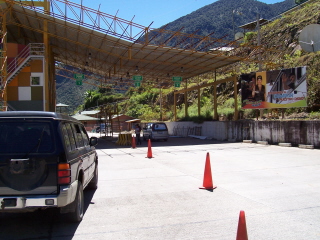
US-funded FELCN (Special Force for the Struggle Against Narcotics) checkpoint between Cochabamba and Chapare, search being conducted for cocaine and precursors
While funding for sustainable development is lacking, the US continues to fund the military presence in the region. At a military base in nearby Chimbote, built with US funds, where once a thousand troops were stationed, the base is nearly deserted, but the interim commander, Col. Edwin de la Fuente Jeria, sits in air-conditioned comfort in his office.
The colonel was as cool as his surroundings. "We have nothing to do with the coca anymore," he allowed, before going on to say that he could say nothing without prior approval from his superiors. According to Reinecke, that was right -- the base now serves primarily as a training ground for local recruits doing their mandatory service.
While campesinos like Vitalia Merida are struggling, the Morales government is attempting to ease their plight. Part of that effort revolves around helping them get their crop to market. In a coca warehouse just outside nearby Shinahota, cocaleros are drying and weighing the crop in preparation for transport to legal markets in Bolivian cities.
"This is our local crop," said Six Federations member Felix Cuba at the warehouse. "Under this new program, we are able to sell direct to the cities without middlemen. This means a little more money for us," he told the Chronicle. "And it keeps the coca out of the hands of the narcos."
While there is constant pressure to earn more money to feed their families, growers are abiding by the growing limit, he said. "We are maintaining the one-cato rule," he said. "It is out of respect for the policy. Evo said we can grow one cato, so to defend the policy, it is only one cato we grow. The federation runs this and we do it through social control."
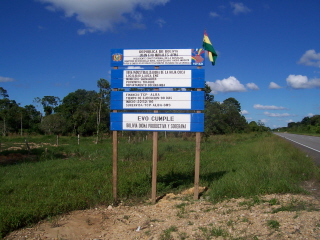
sign announcing construction of coca leaf industrialization plant financed by Venezuela
"Bananas, oranges, papaya, potatoes -- they all rot, and they don't bring much money," said Six Federations leader Juana Cosio as she watched the work at the warehouse. "This year, with all the rains, it is really bad. We grow coca as a back-up," she told the Chronicle. "But we need more markets. That is why we are trying to produce coca flour and other products. We are not narcos, we are just farmers. The government of Evo recognizes that, so now we are at peace here," she said.
Cosio pointed to the assistance provided by the Venezuelan government of President Hugo Chavez, which is providing financing for coca industrialization plants in both the Chapare and the Yungas. "Venezuela is helping us to process and sell our crop," she said.
Under an agreement finalized earlier this month, Venezuela is not only financing the construction of processing plants, but has pledged to buy up to 4,000 tons of coca products, a major breakthrough for a crop whose export is banned under the 1961 United Nations Single Convention on Narcotic Drugs. Under that treaty, the coca plant is considered an illegal drug allowable only as a flavoring agent (with the cocaine alkaloid extracted) or for pharmaceutical use, with chewing of coca leaves to be phased out by 1986.
That isn't stopping Bolivia, Venezuela, and Cuba, which is providing technical assistance, from moving ahead with a People's Trade Treaty signed a few months ago. That treaty allocates about $1 million in investment on coca production research. While the US and international narcotics control bodies have raised objections, Venezuela and Bolivia are standing firm. As Venezuelan Foreign Minister Nicolas Maduro noted as he stood with his Bolivian counterpart, David Choquehuanca, earlier this month, the two nations will move ahead will projects to "value and dignify the coca leaf."
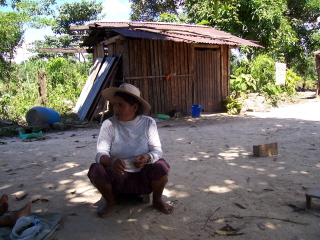
Six Federations coca growers' union member (and former leader) Vitalia Merida in her backyard -- no narco palaces here, as the cocaleros like to point out.
Industrialization of coca processing and expanding legal markets are the correct course of action, said Bolivian Deputy (congressman) Asterio Romero Wednesday. A member of Morales' Movement Toward Socialism (MAS) Party, Romero strongly supports the "coca, si; cocaine, no" policy. "First, I want to say that I am from the Chapare, I was a coca grower leader. It was always "coca zero," but there will never be zero coca," he told the Chronicle. "We fought for many years, we suffered many dead and imprisoned because coca is a source of economic subsistence for us. We will never allow other governments to impose "coca zero" on us. We are a sovereign nation; it is a matter of Bolivian dignity," he said.
"While, yes, we fight against the drug traffic -- and we are doing quite well; seizures of cocaine and precursor chemicals are up -- we also have to decriminalize coca growing, and industrialization is the way," Romero argued. "We have to revalorize the coca, we have to find more markets for coca. There are friendly countries that help us, like Venezuela, and we thank them for that."
Coca production has now been "rationalized" in the Chapare, as the Bolivians like to say, and the repression and state-sponsored violence are a thing of the past, but great strides remain to be taken before the lives of cocaleros there will see real economic improvement. The Morales government, in conjunction with its Latin American allies, is doing what it can to help on that score. But, as the accompanying feature article in this week's Chronicle indicates, it is going to have a battle with the United States and the international drug control bureaucracy on its hands.
back to top
A confrontation is brewing over Bolivian President Evo Morales' effort to rationalize coca production in his country and expand markets for coca-based products. After decades of fruitless efforts to wipe out the coca crop in Bolivia -- the "zero coca" policy embraced by the United States and shoved down the throat of successive Bolivian governments -- Morales, a former coca growers' union leader, has crafted policies that allow for the increased cultivation of coca from the 30,000 acres allowed under current Bolivian law to 50,000 acres. Now, the Morales government is also pushing for expanded legal markets for coca products and, in a joint venture with the Venezuelan government, is preparing to begin coca product exports to that country.
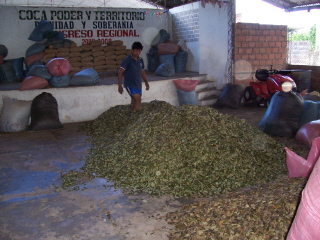
Drying the leaves in the warehouse. The sign reads ''Coca Power and Territory, Dignity and Sovereignty, Regional Congress 2006-08''
That does not sit well with either the United States or the international anti-drug bureaucracy based in the United Nations. This week, the
International Narcotics Control Board (INCB) took direct aim at Bolivia in its
2006 annual report (go to Special Topics, beginning with paragraph 171). In the report, INCB accuses Bolivia of violating the 1961 Single Convention on Narcotics, which defines the coca plant as an illicit drug.
"The situation in Bolivia, which for many years has not been in conformity with that State's obligations under the international drug control treaties, continues to be a matter of particular concern to the Board," the report reads. "Bolivia is a major producer of coca leaf, and national legislation allows the cultivation of coca bush and the consumption of coca leaf for non-medical purposes, which are not in line with the provisions of the 1961 Convention."
The INCB was particularly concerned that Bolivia "has indicated its intention to review existing national drug control legislation, with a view to using coca leaf for a wide range of products, some of which might be exported." That, too, would not be in line with the INCB's interpretation of the Convention.
The language of the INCB report is a clear shot over the bow aimed at the Morales government's expressed policy of "coca, si; cocaine, no" and its efforts to expand the use of the coca leaf for medicinal and nutritional products. Worse yet, in INCB's view, Bolivia could set a bad example for other coca producing countries: "The Board is also concerned that policy developments in Bolivia could have repercussions in other countries in South America," the report fretted.
The United States has also expressed concern about Bolivian coca policy under Morales, as well as concerns about Morales' ties with Venezuelan leader Hugo Chavez, whose government earlier this month finalized an agreement with Bolivia to finance the construction of coca processing plants in Bolivia and to import Bolivian coca products to Venezuela. So far this year, the US government has limited its expressions of concern to worries about the "anti-democratic" natures of the two left-leaning South American leaders, but the State Department's annual review of other countries' compliance with US anti-drug policies is due later this month. A key question is whether Morales' policies will lead the US to "decertify" Bolivia as being in compliance with those objectives.
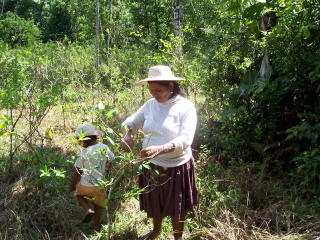
coca grower union member and former leader Vitalia Merida with her daughter in their coca field -- hidden several miles from the road via arduous hike, a legacy of eradication days
The Bolivian government didn't help matters last week when its foreign minister, David Choquehuanca, told a gathering of the Organization of American States that Bolivia would never eradicate coca and that it was more interested in "consensus" than "democracy." "The struggle of the indigenous peoples goes beyond democracy," said Choquehuanca. "In the word democracy, there exists the word submission, and to submit to one's neighbor is not to live well. For this reason, we wish to resolve our problems through consensus."
Clearly, there is no international consensus right now on coca, and if the Bolivian officials and analysts Drug War Chronicle spoke with this week are right, neither is there any indication the Bolivian government is about to bow to drug warriors in Washington and Vienna.
Industrialization of coca processing and expanding legal markets are the correct course of action, said Bolivian Deputy (congressman) Asterio Romero Wednesday. A member of Morales' Movement Toward Socialism (MAS) Party, Romero strongly supports the "coca, si; cocaine, no" policy. "First, I want to say that I am from the Chapare, I was a coca grower leader. It was always 'coca zero,' but there will never be zero coca," he told the Chronicle. "We fought for many years, we suffered many dead and imprisoned because coca is a source of economic subsistence for us. We will never allow other governments to impose 'coca zero' on us. We are a sovereign nation; it is a matter of Bolivian dignity," he said.
"While, yes, we fight against the drug traffic -- and we are doing quite well; seizures of cocaine and precursor chemicals are up -- we also have to decriminalize coca growing, and industrialization is the way," Romero argued. "We have to revalorize the coca, we have to find more markets for coca. There are friendly countries that help us, like Venezuela, and we thank them for that."
"With its opposition to the coca leaf, the INCB merely foments the drug traffic," said Silvia Rivera, founder of the Bolivian group Coca y Soberania (Coca and Sovereignty), professor emeritus of sociology at the University of La Paz, and advisor to Romero. "Every leaf that goes to good, healthy uses is a leaf that doesn't go to the traffickers," she told the Chronicle. "That's the best way to fight against the drug traffickers. Those bureaucrats at the UN simply do not understand; they think coca is a drug."
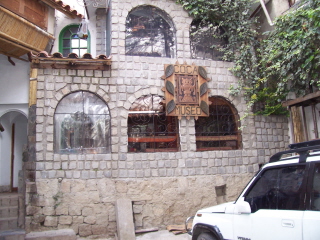
The Coca Museum, downtown La Paz
"It is the same thing with the government of the United States," said Rivera. "The Americans cannot recognize the rationality of other ways of life, and its approach is truly schizophrenic. It fears the drug trade, yet creates the conditions for it to flourish by trying to block other uses for the coca plant. The US tries to argue that Evo is in favor of the cocaine dealers, but it is the US policy that aids them. Also, the US has backed the narco-dictators in the past because they were radical fascists. That's who the US supports and gives arms to so they can kill the people."
In fact, rather than retreating in the face of criticism from the INCB and the US, the Morales government appears determined to push the envelope with its agreement to supply coca products to Venezuela. Bolivia is also making noises about going to the root of the problem by mounting an effort to amend the Single Convention to remove coca from its list of illicit drugs.
"This is a way for Chavez to push the limits and see what the boundaries are," said Kathryn Ledebur of the Cochabamba-based Andean Information Network, which has monitored the Bolivian coca economy and efforts to repress it for years. "Who is going to stop him? There are already substantial coca leaf exports to northern Argentina, and nobody says anything about that. Still, if this helps sharpen the focus on changing the Single Convention, that's a good thing -- it needs to be amended."
Ledebur doubted that the Morales government would make a concerted effort to amend the Single Convention in Vienna next year. "Let's just say that his domestic coca policy is more advanced than his international one," she said. "I see little chance of anything getting done unless there is some sort of concerted lobbying effort with Peru, and I don't see Peruvian President Garcia as someone who is willing to actively buck the US."
Such a move would require a concerted effort by coca producing countries, said Romero, and he didn't see that happening just yet. "It is the job of the Bolivian government to change the Vienna Convention," he said, "but it is also the job of Colombia and Peru to join us at the UN. While we here in Bolivia have with Evo a government with popular support to push this, in Peru and Colombia, the governments are neo-liberal and pro-imperialist and they will not join us. But we are anti-neoliberal and we are going to maintain this position. Still, we are willing to talk government to government and man to man about this."
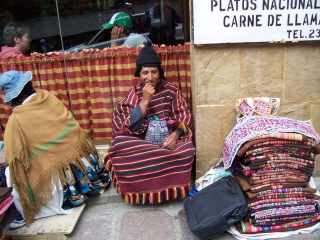
La Paz street vendor Santos, enjoying an afternoon coca chew
But for Romero and the Bolivian government, standing up for coca is a matter of national pride. "We are a sovereign government, and we will move forward with our policies," he said. "Coca is not dangerous, coca is not poison. We will work bilaterally with countries that support our position. And countries that now try to impede us, like the US, well, perhaps we can send them some coca, too."
With Bolivia already facing off against the INCB, the next measure of the Morales government's coca policies will be the US certification decision, which should come by the middle of March. But given the current conjuncture in hemispheric affairs, with a rising tide of left-leaning governments and the US, obsessed as it is with affairs in the Middle East, losing influence in the region, the US may well step back from attempting to isolate and punish Bolivia via the certification process.
"The US still cannot step out of its anti-drug framework of using the military and forced eradication," said Ledebur, "but there is no agreement within the Bush administration about what to about certification. If it decertifies Bolivia, it loses what little leverage it has left. Bolivia now has other sources of assistance, and not just Chavez; it no longer has to blindly obey US dictates. If the US chooses to decertify now, what does it do next year?" she asked.
This is getting very interesting. The Morales government's "coca, si; cocaine no" policy is anathema to both the US and the INCB, but there appears to be little either can do to stop it, and chances are the Bolivian challenge will eventually aim directly at the 1961 Single Convention, perhaps knocking the first hole in what is the legal backbone of the global drug prohibition regime. Stay tuned.
back to top
In a case that could determine whether high school students have the right to enunciate positions on drug policy that are at odds with school district anti-drug policies, the US Supreme Court will soon hear Frederick v. Morse -- popularly known as "Bong Hits 4 Jesus" -- pitting a former high school student from Alaska against his principal and the school board, which punished him for holding up a banner with that phrase outside school property.

Ken Starr wants to discourage any potential ''Bong Hits 4 Jesus'' imitators.
Nearly five years ago, Joseph Frederick, a student at Douglas High School in Juneau, Alaska, displayed his "Bong Hits 4 Jesus" banner after students were released from school to see a parade bearing the Olympic torch passing through town. Frederick was suspended for 10 days by the school principal, who cited school anti-drug policies. He appealed to the district school board, which upheld his suspension, but limited it to the eight days of school he had missed by that time.
Frederick then sued the principal and the school, claiming violations of his state and federal constitutional rights to free speech. Frederick lost in federal district court, but the 9th US Circuit Court of Appeals agreed with him in a 2006 ruling, holding that because the banner-waving did not occur during a school-sanctioned event, the principal and the school district had violated his First Amendment right to free speech.
With the assistance of former Whitewater special prosecutor Kenneth Starr, who is working pro bono, the school district appealed to the Supreme Court, which agreed to hear the case in December. Oral arguments are set for March 19. The school district has argued that allowing Frederick to express himself by referencing drug paraphernalia and drug use could interfere with its effort to promote a consistent anti-drug policy.
The campus-based organization Students for Sensible Drug Policy (SSDP), whose chapters are mainly located at colleges but which has a few at high schools, saw a potential impact of the case on students' ability to challenge drug war dogma, and decided to intervene with an amicus curie brief to the high court. According to the SSDP amicus brief, "Our nation's drug policies directly and intimately affect students' daily lives. Whether it be random drug testing for student athletes or federal financial aid conditioned on lack of any drug conviction, young people are significantly affected in the positions as students by drug-related policies. Students thus have a vested interest in understanding and discussing the underlying issues that guide and affect this country's drug policies. The First Amendment guarantees that their voice on these issues be protected."
"This case focuses on a student who held up an absurd banner, but the school district's argument â if adopted by the Court â would silence free speech in public schools about important topics like student drug testing, the failures of DARE, or medical marijuana," said Kris Krane, SSDP's executive director. "The War on Drugs impacts young people every single day. Students must retain their First Amendment right to debate drug policies that directly affect them," he added.
In a press release last week, American Center for Law and Justice chief counsel Jay Sekulow, called Frederick v. Morse "an extremely poor test case that should not even be considered by the Supreme Court" and called on the court to reverse its decision to hear it.
back to top
Voters in Flint, Michigan, voted to okay the use of medical marijuana by a margin of 62% to 38% Tuesday. Flint becomes the fifth Michigan city to approve such a measure, and while medical marijuana remains illegal under both state and federal law, the Flint vote should only add to momentum to take the issue statewide.
Sponsored by Michigan NORML and the Flint Compassionate Care Coalition, the effort was also aided by assistance from the Marijuana Policy Project and the national NORML office.
Flint now joins Detroit, Ann Arbor, Ferndale and Traverse City as Michigan cities where voters have approved the use of medical marijuana.
back to top
Four Guatemalan police officers in an anti-drug and organized crime unit who were arrested in the gruesome February 19 murders of three Salvadoran politicians were themselves killed Sunday in a brazen assassination inside the prison where they were being held. The two sets of murders are raising serious questions about drug corruption in Central America and, in particular, links between Guatemalan police and organized crime, but the deaths of the police officers means that whatever they knew will go to the grave with them.
On February 19, Salvadoran politicians William Pichinte, Eduardo D'Aubuisson and Jose Ramon Gonzalez -- all members of El Salvador's ruling Arena party -- and their driver were found shot and burned to death in their vehicle on the outskirts of Guatemala City, where they had gone to attend a regional political meeting. With D'Aubuisson being the son of the late Roberto D'Auboisson, who led right-wing death squads in El Salvador in the 1980s, early speculation was that the killings were a political assassination.
But when Luis Arturo Herrera, head of the Guatemalan police organized crime unit, and three of his subordinates were arrested in the crime three days later, various theories related to a drug hit came to the fore. According to speculation in the Central American press, the hit on the Salvadoran politicians came as corrupt Guatemalan police looked for drug money secreted in a hidden compartment in the vehicle. Another version, via Salvadoran police chief Rodrigo Avila, has it that Herrera and his men were tricked into killing the trio by unknowns who told them they were drug traffickers.
Based on GPS devices in Herrera's vehicle, which place it at the scene of the crime, he and his three subordinates were arrested and jailed at the notorious El Boqueron prison some 40 miles east of Guatemala City. On Sunday afternoon, according to eyewitness accounts from inmates' relatives who were visiting the prison, prison guards forced visitors to leave, unknown armed men entered the prison, and the sound of gunshots was heard. The four policemen were found shot to death in their cell.
"They told them [the visitors] that they had to leave because there was going to be a search, and they began pushing the visitors out," said the mother of one prisoner, whose daughter-in-law called her from outside the prison. "When they went outside, they saw armed men enter the prison. Then, when everybody was outside, they heard various gunshots," she said.
"What has happened is that they tried to shut the mouths of those subjects so that they didn't implicate other similar organizations," Salvadoran police chief Avila told reporters. The dead policemen were the victims of "police hit-men," he added. "It is obvious that the persons who committed the murders within the prison have a level of influence within the police structures, or the prison structures, or the structures of the state," Avila said.
Otto Perez Molina, former chief of Guatemalan military intelligence, was thinking along similar lines. "They killed those four because they knew too much about the criminality within the national civil police and they could have implicated the authorities." According to Perez Molina, at least two death squads are operating within Guatemalan law enforcement agencies. "These groups are operating with the complicity of the authorities," he said.
Guatemalan prison authorities Sunday attempted to obscure the circumstances of the killings by trying to tie them to an uprising in the prison that same day by members of Mara Salvatrucha, the Central American gang. But Salvatrucha members who called the press from inside the prison said they rioted after the killings out of fear of being blamed for the officers' deaths.
While the deaths of the four imprisoned police officers means the real reason behind the killings of the Salvadoran politicians may never be known, the two sets of murders are raising questions that could eventually lead to an unveiling of the dark and ugly underside of Central American organized crime and drug law enforcement.
back to top
Former Irish talk show host and current head of the Road Safety Authority Gay Byrne has called for a national debate on legalizing drugs. As host of the Late Late Show in Ireland from 1962 to 1999, Byrne was a leading catalyst in the transformation of Irish society, tackling such taboo subjects as abortion, homosexuality, the sexual abuse of children by priests, divorce, and AIDS. Now, he is speaking out on drug policy.

Gay Byrne
In remarks reported over the weekend, Byrne said he had arrived at the point where he believed fresh thinking on Irish drug policy was needed. "This is a mighty chasm for me to leap," he said, "but I've come to the conclusion that the possibility of legalizing drugs should be looked at."
Byrne said Irish police are spending millions of dollars trying to stop the drug trade and have been doing so for years, without much success. "Dead bodies are being found every day of the week. All I am saying is maybe there is another way of doing it," he said. "Do you keep on trying to solve a problem that has been with us for 40 years, or should we be looking at legalizing the bloody thing?"
Drug prohibition leads to increased criminality, Byrne suggested. "You do not find people killing each other over a packet of cigarettes or a can of Heineken," he argued. "How long do you keep on repairing a car that is not working before you say maybe there is another way of doing this?"
Forever, if the Irish government has its way. Despite growing concerns over prohibition-linked crime, high rates of drug use, and drug overdoses, the government was quick to respond to Byrne's comments with a firm negative. "I'm entirely opposed to legalizing any drug," said Noel Ahern, minister of state responsible for drug policy. "At different stages, different people have tried to make an argument for legalizing drugs. But it's not a suggestion that can work. Drugs are illegal, and that's the right way to have them. Any talk about liberalizing drugs is irresponsible."
Right. Better to continue down the merry path of failing prohibitionist policies than even discuss alternatives, one supposes. But given Gay Byrne's history as a catalyst of change, Ahern and his colleagues in the government might want to think again.
back to top
Barre, Vermont, Mayor Thomas Lauzon's frustration with drugs and drug policy is showing, and it's making him just a touch schizophrenic. In remarks reported in the Barre-Montpelier Times Argus Saturday, Lauzon called for the death penalty for crack and heroin dealers, and in the same breath, called for the legalization of marijuana.
He said he plans to ask the state legislature to adopt the death penalty and to legalize marijuana. Failing that, he said, he hopes to open to a statewide discussion about the state's drug problem, probably beginning with an April forum in Barre.
Barre (pronounced "berry") is an old-time boomtown that in days gone by was known as "The Chicago of New England." Today Barre is famed as an exporter of fine, granite, graveside monuments, a distinction that earned it a "ZipUSA" feature in the October 2003 issue of National Geographic.
"People who are dealing crack and dealing heroin have zero social value and should be put to death," Lauzon said. "I'm sure everyone will distance themselves from me," Lauzon said Saturday of his death-penalty call. "But if anyone tells you we're winning the war on drugs, they're lying."
Saturday evening he reiterated that stance in another interview with the Times Argus. "What social value do they have? They are dealing crack and heroin to young people, knowing full well what the effects will be," the mayor said. "What purpose do they serve in society other than to destroy lives, to destroy families?"
Vermont politicians reacted cautiously. State Sen. Richard Sears (D-Bennington), chair of the Senate Judiciary Committee, said he understood Lauzon's frustration, but didn't embrace either the death penalty for dealing hard drugs or legalizing marijuana. "I think the man is very frustrated, and I understand his frustration," Sears said. "The problem in my view is we've ignored this problem until it's out of hand."
Jason Gibbs, a spokesman for Gov. James Douglas, told the newspaper that while the governor was not unalterably opposed to the death penalty, he was opposed to legalizing marijuana. "He's not unalterably opposed to the death penalty, but he doesn't have any plans to introduce it. There are some circumstances he would support a death penalty, but I'm not sure this is among them," Gibbs said. "Marijuana is a gateway drug for some folks, so he would not support legalization."
Lauzon said he had discussed his proposals with some legislators, but hadn't gotten very far. "They listen politely. I would like to have a statewide conversation. The conversation I'd like to start with is 'How are we doing?' Are we happy with our progress in the war on drugs? What are we doing in Vermont with regard to the war on drugs?" Lauzon said. "Maybe we start in Barre."
While Lauzon's proposal for the death penalty for drug dealers is a first in recent Vermont history, his call for legalizing marijuana echoes one made last December by Windsor County States Attorney Robert Sand, who called for the legalization of marijuana and decriminalization of other drugs. And so goes the drug debate in Vermont.
back to top
The British government is prepared to begin prescribing heroin through the National Health Service to "recidivist veteran users" after a pilot program has proven successful, according to a report in the newspaper The Independent, which cites a "restricted" briefing paper prepared by the Home Office strategic policy team. The briefing paper also suggests the licensing of heroin and cocaine sales, but the government will not go that far, The Independent said.
According to the brief, which The Independent says it has obtained a copy of, "The Home Office should consider wider rolling out of injectable heroin prescription for highly dependent users through the NHS. Given the failure of supply-side interventions to have any significant effect on the drugs market, it is worth considering a greater management of the market by wider rolling out of injectable heroin prescription for highly dependent users through the NHS."
According to the Home Office sources cited by the newspaper, only hard-core users who have not responded to methadone treatment will be eligible. "It is only going to apply to a small number of people," said a Home Office spokesman.
Home Office sources added that in Switzerland, where doctors prescribe heroin rather than methadone to such users, 26% have quit using and criminality and unemployment have decreased. Citing the Swiss experience, the brief says, "Contrary to popular belief, there is evidence that heroin does not necessarily intoxicate the user -- it can be stabilized with people living relatively normal lives."
The brief also warns that Britain is in a losing battle with drug smugglers and suggests legalizing the sale of heroin and cocaine. "There is mounting evidence of the impossibility of winning the war against drugs supply. A system of controlled availability of drugs would allow the Government to exert a much greater degree of influence over the way in which substances are used than is currently possible," the report advised. "There is a strong argument that prohibition has caused or created many of the problems associated with the use or misuse of drugs. One option for the future would be to regulate drugs differently, through either over-the-counter sales, licensed sales or doctor's prescription."
But in an Independent on Sunday editorial, the newspaper noted that the government will not move to license or otherwise regulate drug sales. "Legalising drug supply has been firmly rejected by the government because it would sanction the use of drugs," the newspaper noted. "The policy of targeting drug smugglers and dealers continues, despite the report's warning that reducing the drug supply drives up the price and increases crime."
back to top
Ken Gorman tribute site
Maryland mandatory minimum report, from the Justice Policy Institute
Groups blast International Narcotics Control Board for blocking effective HIV/AIDS prevention
Private Prisons: Commerce in Souls?, Silja Talvi documentary (video) for SourceCode, The Dish Network
Amnesty International on Colombia paramilitary demobilization (they call it a sham), with Mark Fiore animation
AI Group 86 radio with cops against drug war, Real and MP3
Tony Newman on "$125 for a pack of cigs!" in California prisons, Huffington Post
East-Village.com article about Tony Papa art opening
Does James Bond support legalisation? Daniel Craig on the Transform blog
back to top
Are you a fan of DRCNet, and do you have a web site you'd like to use to spread the word more forcefully than a single link to our site can achieve? We are pleased to announce that DRCNet content syndication feeds are now available. Whether your readers' interest is in-depth reporting as in Drug War Chronicle, the ongoing commentary in our blogs, or info on specific drug war subtopics, we are now able to provide customizable code for you to paste into appropriate spots on your blog or web site to run automatically updating links to DRCNet educational content.
For example, if you're a big fan of Drug War Chronicle and you think your readers would benefit from it, you can have the latest issue's headlines, or a portion of them, automatically show up and refresh when each new issue comes out.
If your site is devoted to marijuana policy, you can run our topical archive, featuring links to every item we post to our site about marijuana -- Chronicle articles, blog posts, event listings, outside news links, more. The same for harm reduction, asset forfeiture, drug trade violence, needle exchange programs, Canada, ballot initiatives, roughly a hundred different topics we are now tracking on an ongoing basis. (Visit the Chronicle main page, right-hand column, to see the complete current list.)
If you're especially into our new Speakeasy blog section, new content coming out every day dealing with all the issues, you can run links to those posts or to subsections of the Speakeasy.
Click here to view a sample of what is available -- please note that the length, the look and other details of how it will appear on your site can be customized to match your needs and preferences.
Please also note that we will be happy to make additional permutations of our content available to you upon request (though we cannot promise immediate fulfillment of such requests as the timing will in many cases depend on the availability of our web site designer). Visit our Site Map page to see what is currently available -- any RSS feed made available there is also available as a javascript feed for your web site (along with the Chronicle feed which is not showing up yet but which you can find on the feeds page linked above). Feel free to try out our automatic feed generator, online here.
Contact us for assistance or to let us know what you are running and where. And thank you in advance for your support.
back to top
RSS feeds are the wave of the future -- and DRCNet now offers them! The latest Drug War Chronicle issue is now available using RSS at http://stopthedrugwar.org/chronicle/feed online.
We have many other RSS feeds available as well, following about a hundred different drug policy subtopics that we began tracking since the relaunch of our web site this summer -- indexing not only Drug War Chronicle articles but also Speakeasy blog posts, event listings, outside news links and more -- and for our daily blog postings and the different subtracks of them. Visit our Site Map page to peruse the full set.
Thank you for tuning in to DRCNet and drug policy reform!
back to top
With the launch of our new web site, The Reformer's Calendar no longer appears as part of the Drug War Chronicle newsletter but is instead maintained as a section of our new web site:
- Visit http://stopthedrugwar.org each day and you'll see a listing of upcoming events in the page's righthand column with the number of days remaining until the next several events coming up and a link to more.
- Check our new online calendar section at to view all of them by month, week or a range of different views.
- We request and invite you to submit your event listings directly on our web site. Note that our new system allows you to post not only a short description as we currently do, but also the entire text of your announcement.
The Reformer's Calendar publishes events large and small of interest to drug policy reformers around the world. Whether it's a major international conference, a demonstration bringing together people from around the region or a forum at the local college, we want to know so we can let others know, too.
But we need your help to keep the calendar current, so please make sure to contact us and don't assume that we already know about the event or that we'll hear about it from someone else, because that doesn't always happen.
We look forward to apprising you of more new features on our web site as they become available.
back to top











